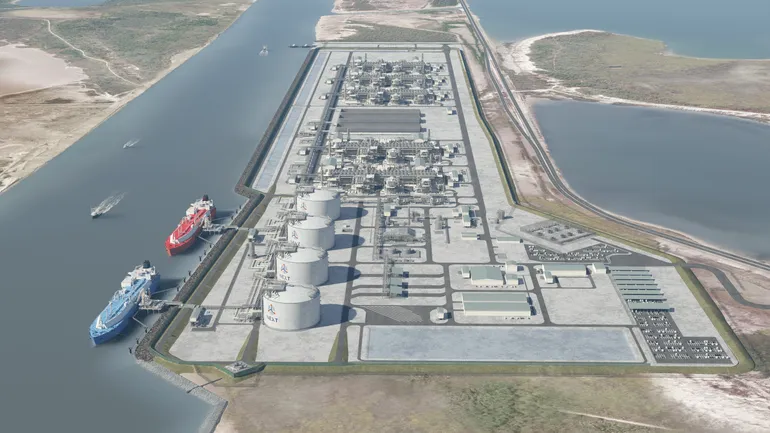Dive Brief:
- Highlighting the risks inherent to multibillion-dollar construction projects, a federal court ruling has cast questions over a new $4.3 billion contract for a liquefied natural gas facility in Brownsville, Texas.
- Houston-based energy firm NextDecade announced the $4.3 billion engineering, procurement and construction contract with Reston, Virginia-based Bechtel for Train 4 of its Rio Grande LNG project on Aug. 5. In 2023, Bechtel started work on Phase 1 of the project — valued at $12 billion — which includes Trains 1, 2 and 3.
- But one day after the Train 4 contract news broke, the U.S. Court of Appeals for the District of Columbia Circuit overturned the Federal Energy Regulatory Commission’s authorization for Rio Grande, saying the agency should have issued a supplemental environmental impact statement before approving the build.
Dive Insight:
In an Aug. 6 release following that ruling, NextDecade said it was “disappointed in the court’s decision and disagrees with its conclusions.”
The firm said it was assessing its options and that construction on Trains 1, 2 and 3 is continuing. But it also said it would need to evaluate “the impact of the court’s decision on the timing of a positive final investment decision on Train 4.”
That final decision, which would give Bechtel the green light to proceed on the next train, was originally slated for the second half of 2024 and in its release detailing the new $4.3 billion EPC contract with Bechtel, NextDecade said the deal’s price validity extends only through Dec. 31 of this year.
Now, however, the court’s ruling casts uncertainty over that timeline. A Bechtel spokesperson referred questions on the matter to NextDecade, which said it didn’t have additional comments beyond its release.
The total cost of Phase 1 is projected at $18.4 billion, while NextDecade put a pricetag of $6 billion to $6.2 billion on Train 4 alone, for a total outlay of up to $24.6 billion.
The start-and-stop succession of announcements at Rio Grande illustrates how complexity, legal issues and regulatory unknowns on megaprojects can lead to heightened risk for contractors.
Other big building firms have grappled with issues on massive builds recently as well.
Earlier this month, Venture Global LNG sued Kiewit in connection with work on its Calcasieu Pass plant in Cameron Parish, Louisiana. The suit alleged the Omaha, Nebraska-based contractor passed confidential information about the $4.5 billion project’s design and construction to competitor Shell. Kiewit did not respond to Construction Dive’s request for comment on the matter.
Meanwhile, at another LNG project last month, the $11.6 billion Golden Pass export terminal in Port Arthur, Texas, lead contractor Zachry Holdings filed for Chapter 11 bankruptcy and came to an agreement with the project’s owners to exit the deal after the build went $2.4 billion over budget.
And on its most recent conference call, heavy civil contractor Tutor Perini, which doesn’t specialize in LNG facility projects but bids and builds large infrastructure jobs and has constructed tunnels for gas pipelines, pointed to legal disputes on past jobs negatively impacting its financial results.
Although it had said on previous earnings calls that it hoped to put those types of charges from megaprojects behind it, executives said they still needed more time to fully get past the impacts of those disputes.
“We had hoped that by the end of this year, we’d be out under from these charges,” said Tutor Perini President Gary Smalley on the call. “A year from now, we think this will be behind us… so [we] just appreciate your patience, give us a little bit more time. We’re almost there, but not quite, obviously.

